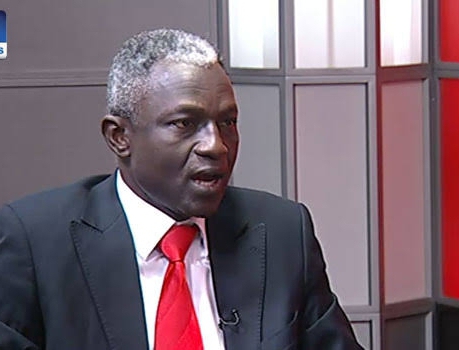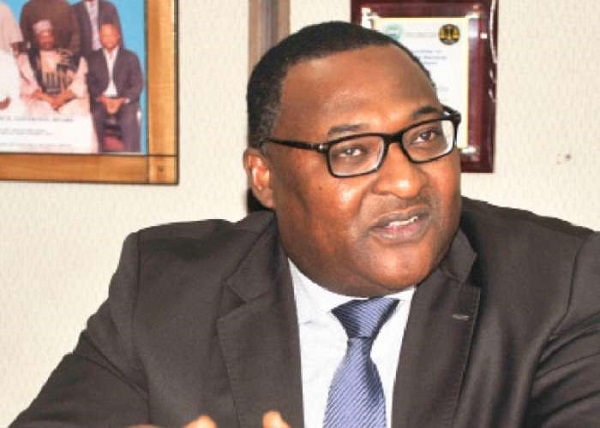How To Stimulate Private Investments In Pipelines For Economic Growth
By Kenneth Jukpor

Engr. Bala Zakka is the Technical Director, Drill Bits at Template Design Limited. He was one of the resource persons at the 3rd National Transport Summit organized by the Chartered Institute of Transport Administration (CIoTA) Nigeria, in Abuja recently.
At the summit, he delivered a paper on “Technical and Safety Regulation of Pipeline Transportation in Nigeria.” Subsequently, he granted this interview to our correspondent as he expounds on the utilization of pipeline mode of transportation beyond oil. He also explains how the government could attract private investments in the sub-sector, addresses the scarcity of clean water in coastal areas, defines a role for pipeline transport in the African Continental Free Trade Area (AfCFTA), among other pertinent issues.
Enjoy it:
You stressed the need to have a comprehensive pipeline network across the nation, not only for the distribution of petroleum products but other items as well. How strategic is this pipeline network to a nation’s transport system?
A strategic grid or pipeline connection simplifies things in this sub-sector of transportation. From a particular point, one could see the entire grid and if there will be blockages or obstructions, you’re going to know because there will be the deployment of technology known as SADA. This tool and other similar ones provide an opportunity to monitor the activities of pipelines and the only way to achieve this is when there is a network or a grid.
To that extent, a grid system is very good because at every point in time, one can see where there are issues in the pipeline network. If you’re feeding the needed locations with the pipeline, it is a grid system that would show where the challenge is. There could be obstructions or certain aspects of the pipes may have been bent beyond where they should have reached. A lot of technical issues will be known if the nation uses a grid or network system because it provides a centralized platform for monitoring pipeline activities.
The Dangote Refinery is a major project coming up soon but there is no pipeline connection for easy distribution of the products. How significant is pipeline transport mode to a massive project like Dangote Refinery?
In order to appreciate the beauty and ease of pipeline transportation, one can look at the congestion on the nation’s roads and the extent to which they deteriorate. We also have to note the unpleasant human carnage and calamities on the roads which result from tanker accidents. All these are disasters that could have been prevented with the efficient utilization of pipelines.
A lot of fluids such as; crude oil, premium motor spirit, kerosene, diesel, water, among others, should be conveyed via pipelines. However, considerations weren’t made on the soil chemistry of most Nigerian roads before they were built and some of these roads weren’t built to carry tankers or trucks above a given capacity. This emphasizes the importance of pipelines.
Back to your question on Dangote Refinery, a place like Lagos is already challenged with high traffic congestion on the roads because of the population. With Dangote Refinery at the Ibeju-Lekki axis, one can imagine the thousands of tankers going to that facility to evacuate products every day. If there’s no pipeline connection, there would be an enormous logistics challenge to the point where the consumers would be frustrated, residents in the area and the investor, Dangote Group will also be frustrated.
What we have advised in the Pipeline Transportation group at CIoTA is that the Transport Ministry looks at a situation where apart from the production of the finished petroleum goods encouraged by the Nigerian government; there should be pipelines for the evacuation of these goods to areas with less traffic congestion.
Pipelines could be linked from Lekki to the Ijebu-Ode axis from where tankers or rail wagons could evacuate the products. The good thing about pipeline mode of transport is that it doesn’t require so much space. You could have a diameter as large as 30ft or more to evacuate the products and have receiving points in Oyo, Ogun or Edo States where tankers or wagons could move the products.
A network of pipelines is needed at Lekki, especially for the Dangote Refinery. Another good thing about pipelines is that if you carryout the soil integrity analysis and ensure that at the point of technical construction of the pipelines, especially steel ones you don’t compromise on quality; they would continue to deliver as long as you keep using good compressors and machines to pump the products.
The function of pipelines can be likened to the heart in the human body. The heart is like the compressor and when you look at the human system, blood flows through the entire body via pipelines known as veins.
Pipelines can be used to move products to all the depots across the country. Tankers can collect products from the depots and distribute them to metropolitan cities. In a real sense, we shouldn’t have tankers coming from Maiduguri or Sokoto to Apapa to convey petroleum products or any liquid product.
At CIoTA, we are yearning for an opportunity to redesign the entire transport system, especially the pipeline mode.
One of the biggest developments in the nation’s oil and gas sector this year was the passage of the Petroleum Industry Act (PIA). This Act makes provision for deepening gas investments, but what provisions does it have for pipeline development via investments?
There is no direct emphasis on pipeline investments but the Act talks about reviving the midstream oil sector. Midstream has to do with the movement of crude oil from the point where it is extracted which is called the well-head to the point where it would be sent out for export or to a refinery. The connection between these two locations is called midstream and pipelines should be used for these activities.
PIA already said there would be midstream activities, so it means there should be a connection of pipelines to link the extracted crude oil to the export depots or the refineries. Refineries in Warri, Port Harcourt and others will be fed by pipelines connected from the oil-wells. Alternatively, there could be pipelines from the oil wells to other locations with less traffic where they could be transferred to train wagons to move by train to the refineries or export depots. Nevertheless, the initial movement from the oil wells should be via pipelines.
Public-Private Partnerships (PPP) is the buzz word for infrastructure development across various nations today. Is this framework available for investments on pipeline assets in Nigeria?
Pipeline is a transportation mode; it’s akin to asking if it’s possible for people to venture into road transport by bringing in vehicles or the aviation sector by operating aircrafts. Everything is dependent on the host country. Has Nigeria shown that investments in pipelines will be protected? If the government could provide security and guarantee that an investor’s pipeline infrastructure wouldn’t be destroyed, several investors would come forth.
There is also a need to provide an enabling environment for pipeline investors. What’s the internal logistics like? How would potential investors recruit and accommodate members of staff? What kind of fiscal incentives such as tax holidays or rebates would be given to investors?
If the investors will be exempted from taxes in the first three years, it would be a good incentive to enable them properly plan the recruitment and care for staff, get the required expertise and stabilize the organization for three years before paying taxes. Another alternative could be to demand the payment of just 10%, 20% or 50% taxes for investors in the pipeline sector because it is a novel industry in terms of private investments in the country.
The Nigerian government may also opt to have a stake in the pipeline investments to show its support. These are incentives that could spur investments in the pipeline sector. Organizations would analyze these incentives before making the decision to invest. That’s why the most hostile nations may still appeal to certain investors for some products or projects, while the more peaceful ones are overlooked for similar projects.
During your presentation, you highlighted other profitable uses of pipelines beyond the oil sector; for water desalination, irrigation, managing sewage, distributing fertilizers, etc. How much could Nigeria benefit from these strategies and what’s the framework for investments in these areas?
The nation could earn massively from the judicious utilization of pipelines but it depends on how attractive the government makes the sector for investors. We can look at the examples in the United Arab Emirates (UAE), places like Dubai and Saudi-Arabia where there are massive pipeline infrastructures that aren’t oil refineries. Some of them are salt-water refineries. They derive the salty water from the seas and filter it to separate the salt. The clean water is sent to the hinterlands.
At some locations in Nigeria, crude oil is available in abundance, but they prioritize water because there is no clean water in those areas. We could have such water refineries in those locations because they are mostly connected to the seas. After separating the salt from the clean water, the salt could also be sold. There is domestic salt and industrial salt.
In the oil and gas sector, salt also has value because it is used to clean the drilling pipes after drilling operations. After drilling, you remove the mud and clean the pipes with brine and brine is just salt and water.
Look at the coastal parts of Nigeria where we have blackish water and salt water, Akwa-Ibom, Delta, Edo, Lagos, Rivers, Ondo, among others. In Bayelsa, almost every town is on water but the water is either blackish or salty. There is no clean water. Imagine that the nation has salt-water refineries lined up in these areas; it means such locations will not only have clean water, but also supply the drinking water in neighbouring cities. Apart from the desalination plant, every other item that makes up the facility is pipeline.
We also have to note that these projects would provide massive employment for the host communities. Bayelsa and Rivers State governments could team-up to have one desalination plant. Governments should be generational in their thinking. All projects mustn’t have a 4-year execution plan or 8-year at most.
The Japanese are succeeding because you’ll find a 70-year old man with a business plan for 50 years. He mayn’t be alive in 50 years but his passion and thought pattern is such that he would opt to think ahead and plant the seed today. Nigerian governments are mostly concerned about projects that would start and finish under their respective administrations but I posit that they can come up with desalination projects that could outlive their tenures.
It is important to note that these types of projects are also available in some African countries. In Libya, Gaddafi constructed concrete pipelines and created the ‘Great Man-made river’. This was what Gaddafi used to supply irrigation in the whole of Libya, despite having crude oil. This initiative succeeded in Libya, UAE, Dubai, Saudi-Arabia, among other nations. Why can’t we have such projects in Nigeria? How many universities do they have in these nations that successfully established such facilities? How many professors and maritime technocrats do they have?
At CIoTA, we will continue to do advocacy and pray that the necessary authorities listen to us. We must also ensure that at every National Assembly meeting, the Institute attends to make a case for transportation and by extension, pipelines. What we are doing is planting a generational seed. I mayn’t be alive to benefit from what will crystalize; but I would rather plan for a better future for the next generation.
African Continental Free Trade Area (AfCFTA) presents the biggest trade market in the world, what role could pipeline transport play in this regional trade area for Nigeria and for the continent?
There is definitely a role for pipeline mode of transportation in AfCFTA, but honestly I haven’t seen the role Nigeria intends to play in AfCFTA to begin with. We talked about Dangote Refinery earlier and it’s a private investment. Imagine that we had 5 to 10 of such investments in Nigeria. Pipeline would be the transport mode to ensure the smooth evacuation and distribution of these products.
The Nigerian government could construct rail lines and pipelines across the West and Central African sub-region to pump the refined PMS, diesel, fertilizer and other items to neighbouring countries.
However, there is a need for a national backing and an enabling environment that would ensure pipeline investments thrive and the refineries are also sustainable.






